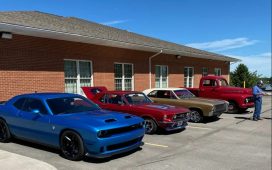The world is a comedy to those who think and a tragedy to those who feel. Horace Walpole coined that phrase, Succession creator Jesse Armstrong quoted it in his review of a book on disgraced crypto entrepreneur Sam Bankman-Fried, and his new film Mountainhead brings that sentiment to life.
Mountainhead is a film built for the moment – and these days, moments are more ephemeral than ever. That’s precisely why Armstrong, rushed his idea for a fictional summit between tech billionaires to the screen in a matter of months. He pitched it to HBO in December, filmed it in March, and released it today on OSN+ across the Middle East.
The film stars Ramy Youssef, Cory Michael Smith, Steve Carell and Jason Schwartzman as four of the world’s most powerful – and self-declared ‘smartest’ – men, each with a different claim to fame.
It’s not based on a true story, but it clearly draws from reality. Randall (Carell) is an elder statesman financier in the style of Peter Thiel, Jeff (Youssef) is an AI entrepreneur like Sam Altman, Venis (Smith) is the richest man in the world who owns a major social media app similar to Elon Musk. Schwartzman, meanwhile, plays a character call ‘Souper’ – short for soup kitchen, due to his significantly lower net worth.
The film is entirely set at a house in the Rocky Mountains, where the four old friends meet for a weekend of fun and end up becoming consumed by the impact of Venis’s latest product – generative AI that can create undetectable deepfakes. Within hours of its launch, the world descends into chaos – with inflammatory uses of the tech causing mass violence across the world. Their reactions are naive and self-interested, to say the least.
Armstrong has long been interested in the workings of power. But after the conclusion of Succession, and in preparation for his review of Michael Lewis’s book Going Infinite, chronicling the rise and fall of Bankman-Fried, he grew obsessed with those on the cutting edge of new technology – men who were changing the course of human history with a hastily-cobbled philosophy guiding their way forward.
The venal Prometheans in Mountainhead speaks the language of this philosophy – they talk reverently of ‘first principles’, for instance – an idea that guides many in the tech space, including Musk. First principle thinking in tech involves boiling down complex problems into their most fundamental, indisputable truths to build new solutions from the ground up – rejecting all orthodoxy completely.
The success that the Mountainhead billionaires – who call themselves the Brewsters – have found in life has led them to believe that they have it all figured out. They see themselves as the world’s true leaders – and they have their fingers on the buttons that can bend the world to their will. And in their minds, all their actions are for the greater good. The future they are working towards is transhumanist – in which the consciousness of every person on earth will be uploaded into the cloud to exist in a state of bliss.
In the meantime, they believe their every innovation will solve all the world’s problems and heal all wounds – despite all evidence to the contrary, and with little depth to their analysis. “Once one Palestinian kid sees some really bananas content from one Israeli kid – it’s all over!” Venis remarks.
In Succession, Armstrong needed to make his lead characters somewhat sympathetic for the sake of keeping viewers on board for a long-term narrative – here he has no such necessity and chooses not to. The only one with any semblance of a conscience is Youssef’s Jeff, who realises his AI detection tech holds potentially the cure to the info-virus that Venis has just unleashed into the world. Youssef, who is an outspoken activist for peace in Palestine in real life, is a knowing bit of casting – but his character proves to be just as corruptible as the rest. Youssef’s performance as he captures those layers proves to be the best turn of his career.
Warning: The rest of this article contains spoilers
This all could have become something more akin to a Black Mirror episode if Armstrong had wanted to, but that’s just not what interested him. It seems at first that things will play out as a spin on the work of Ayn Rand (the title is a play on Rand’s The Fountainhead, after all), with the world’s most powerful literally removing themselves from society completely as the world burns. Instead, it becomes a darkly comic spin on Hitchcock film Rope.
Before that, the film does toy with the idea of what these men may do if they decided to wield the levers of power at their disposal completely – they consider staging a coup of the United States, buying a country such as Haiti and ‘relocating’ its inhabitants and turning it into their own state, and more – but these plans are forgotten when they decide that their real problem is Jeff.
Jeff wants Randall to push Venis out from his company and stop the world from burning, giving his own AI detection tech to the government for regulatory purposes. Randall, on the other hand, has incurable cancer, and Venis promises him that he will be the first to have his consciousness uploaded to the cloud. Randall then conspires with Venis and Souper to kill Jeff – and they speak about his murder with the same euphemistic Silicon Valley speak.
It is there that the film’s real message starts to emerge. Yes, these people may be brilliant in many ways, and yes, they may truly believe in their moralistic ambitions. But they are still human, as much as they may pretend to have transcended the rest of humanity. There are still guided by fear, jealousy and pride. They are still capable of stupidity, as much as they feel their net worth inoculates from it.
As a result, the techno babble and first principles talk become another tool which they use to get what they want – a lie they tell themselves, each other, and the world. This is a film about the hubris and folly of man – the only true constant in an ever-changing world. They worship ‘progress’ – and the progress they want is whatever grants them more power.
They don’t kill Jeff, in the end. After locking him in a sauna, filling it with gasoline and threatening him with a match, they force him to sign over his company to them. And the next morning, when the dust settles, Jeff comes to breakfast with only moderate disgust for his friends.
When Jeff goes to leave, Venis follows him, offering him a partnership – to integrate Jeff’s tech into Venis’s destructive tech to make it even more powerful, and bring about the transhumanist world that they always wanted. Jeff agrees, dropping all of his previously held moral qualms – his only condition being that they cut Randall out completely as an act of revenge.
To them, this is all a comedy. They have lost the ability to feel and have no concern for the well-being of humanity. They don’t need to create a secret Randian retreat to separate themselves from society – they have already separated themselves in their minds. As a result, we can infer, their actions from here will never take humanity’s well-being in concern – and for everyone else, this will become a tragedy. They do the thinking, but the rest of us must feel the consequences.
Ultimately, this is the most cynical work yet from Armstrong, and may prove to be his most divisive. But as far as food for thought, there’s plenty here to chew on – just be careful of the bitter aftertaste.






